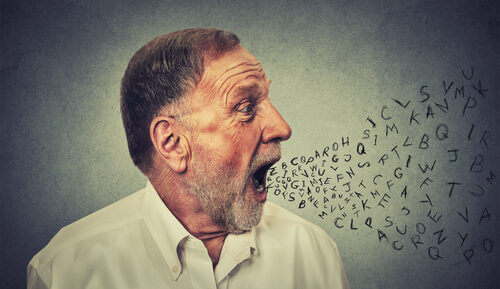Aphasia affects a person’s ability to speak. It is a disability that is caused by damage to the brain, often a stroke or dementia.

Page contents
What is aphasia?
Aphasia is a disability that affects speech and language.
People who have aphasia have difficulty with forming words and sentences, and with comprehending language.
This is caused by damage to their brain.
The damage can be caused by a stroke, injury, a brain tumour, dementia or various other conditions.
Symptoms of aphasia
A person with aphasia can have difficulties with:
- Getting words out – they can know exactly what they want to say but not be physically able to say the sentence
- Saying the wrong word
- Saying words in the wrong order
- Creating full sentences
- Following and actively participating in a conversation
- Reading, writing and numbers
Aphasia vs dysphagia
Aphasia is difficulty with talking, while dysphagia is difficulty with swallowing or chewing.
They are different disorders but can have similar causes, so somebody may experience both for the same reason.
Expert advice straight to your inbox

What causes aphasia?
Aphasia is caused by damage to the brain. The damage is usually on the left side of the brain, in areas responsible for speech and language, such as the cerebrum.
Causes of this damage can include:
- Stroke
- Brain/head injury
- Dementia
- Brain tumour
- Brain haemorrhage
- Infection
- Swelling
Are there any treatments for aphasia?
Aphasia is treatable and can get better over time, depending on the cause. Some people eventually make a full recovery, while others can learn to manage their symptoms and adapt to new ways of communicating.
Unfortunately, when the cause is a progressive illness like dementia, the person’s aphasia can get steadily worse, but treatment can still help.
The main treatment for aphasia is speech and language therapy. This uses various techniques to restore a person’s ability to speak, as well as find different methods of communication.
If the aphasia is caused by an infection or other treatable condition, the aphasia sometimes goes away on its own once the underlying cause has been treated.
How to support someone with aphasia
Aphasia is an often invisible disability. People who live with aphasia can carry a card explaining that they need time to speak.
Ways you can support somebody with aphasia include:
- Give them time to speak without interrupting or finishing their sentence for them
- Speak slowly and clearly
- Offer alternative ways of communicating if they are really struggling, such as asking them to spell, write or draw the word, or reading their facial expressions and body language
- Notice if they are getting tired; people who have brain damage of any sort can get exhausted, which can make their symptoms worse. This happens more in the evening or when they have been using a lot of brain power
Find a care home near you
Jennie’s experience with aphasia after a stroke
Jennie Kersey lives with aphasia after having a stroke in 2018. She was 38 at the time.
Ms Kersey explains: “I’d been out drinking the night before and I came home and went to sleep. The next day, my husband at the time was going out and I was still sleeping. He came to come and get me and I couldn’t speak properly. I was all over the place. They called 999 to come and get me.
“The paramedics didn’t think I’d had a stroke, they thought it was something else. Then basically I was asleep, I was out, then my whole side went down. I still don’t have any strength in my right hand; my friends who have got aphasia as well, their whole arm’s not working so I’m quite lucky.
“When I first had the stroke, I couldn’t talk at all. Just say ‘toilet’ and that was it really. Then I started to get better. I went back to Mum and Dad’s and they were really good with looking after me. Then I began to do Speakability in Newbury with people that have got aphasia and that really helps me with speech therapy.
“You get therapy with the NHS. Basically, I had the 10 days then they gave me 8 weeks speech therapy, and also for walking and stuff like that. That was in the July through to the September and then I got very ill with psychosis and went back to hospital for 16 weeks. That happens apparently with young girls that have a stroke, it happens a lot. I can’t remember a lot of it.”
Jennie was working full-time before her stroke and her company adapted her role and hours to enable her to continue working.
‘My life changed’
She says: “My life changed, my life is different now, it’s pretty amazing really. I get PIP to help me with money because obviously I want to work properly but I can’t.”
Jennie still struggles with her speech and exhaustion but has made an incredible recovery and is still getting better.
She explains: “In my brain it’s there but it doesn’t come out, it gets annoying. There’s so much in my head that I could tell you but it doesn’t come out, it’s so frustrating.
“It’s worse when I’m tired. I have to go for a little sleep, it’s like I’m 80!
“Every day it gets better. They told me that when I was at the hospital, they said you get six months and then that’s kind of it [for recovering any further]. But it’s a lie, I can tell you, I can speak properly, better than I used to anyway and every day I get better.”
Jennie is hitting milestones: “Little things like get a train on my own. I’ve got epilepsy as well, because of the stroke, so I was worried I’d have a seizure and end up in London on my own and I can’t speak properly, imagine it! So I did that, I was really pleased with myself then.”
‘It’s little steps’
Jennie’s advice to other people in similar circumstances is: “You’re okay, it will get better. It’s hard, it’s going to be really hard, but it’s little steps.”
She recommends a book called Healing the Broken Brain; “It’s a gentleman in America that was only ten when he had the stroke and basically he’s now got children and his life is pretty alright.”
For videos and advice from Jennie, her Instagram handle is: @Jenniekersey80.
To watch Jennie in an earlier interview by Say Aphasia, see below.
What is aphasia?
Aphasia is a disability affecting a person’s ability to communicate through language, including speech and writing. It is caused by damage to the brain such as a stroke, dementia, brain tumour or brain injury.
What are the symptoms of aphasia?
People with aphasia can struggle to articulate their thoughts. They may take time to say the words they need, be able to speak quickly but not necessarily the right words to express their meaning, or find it difficult to speak or write in full coherent sentences.
Can aphasia be treated?
Aphasia can be treated through speech and language therapy. Some people may make a full recovery but some will not, but they can access support to find new ways to communicate.


